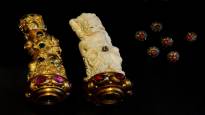Indonesia and Sri Lanka recover valuables seized by Dutch soldiers. The so-called Lombok treasure will be among the first to be returned to Indonesia.
Europe’s former colonial masters are going through the legacy of colonialism.
The Netherlands has taken practical measures in this matter. On Saturday, King Willem-Alexander apologized for his country’s role in the slave trade. He regretted the Netherlands’ part in the business, which resulted in an estimated 12 million people being shipped from Africa to forced labor in South and North America.
It is estimated that Holland sent more than half a million people into slavery.
As a practical gesture, Holland begins to return hundreds of looted valuables to former colonies. Among other things, a cannon cast in bronze and decorated with precious stones, which was on display in the Rijksmuseum in Amsterdam, will be returned to Sri Lanka. It was apparently captured by Dutch forces during an invasion in the 1740s.
A collection of jewels, called the Lombok treasure, will be delivered to Indonesia. Lombok’s stones were apparently stolen from the island’s royal palace in the 19th century.
Dutch Minister of Culture Gunay Uslu considers the initiation of returns to be a significant step.
– For the first time, we are returning objects that should not have been transported to Holland in the first place, Minister Uslu said.
According to the Minister of Culture, it is not only about returning objects, but about cooperation between countries. The British broadcasting company BBC writes about it, among others.
In the Netherlands, the investigation of the colonial legacy has been accelerated by a report published in 2020, which calls for the return of valuables without delay, if the country of origin so demands.
Other European countries have also started returning valuables to Asia and Africa. For example, bronze statues looted from Nigeria have been returned to Benin.
Reuters
